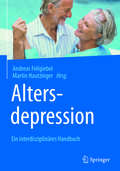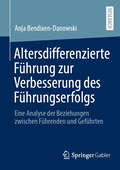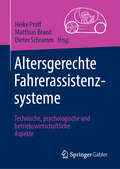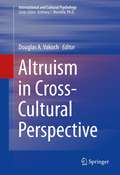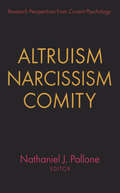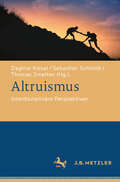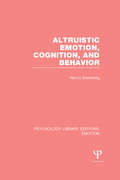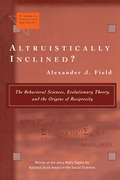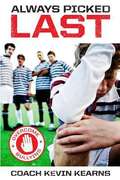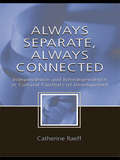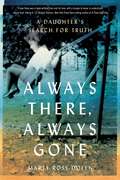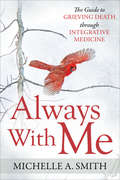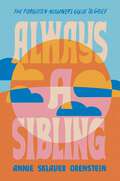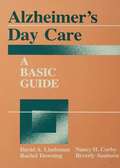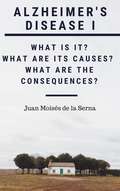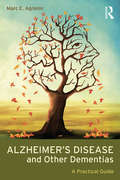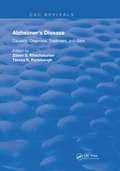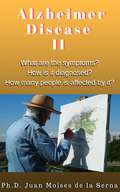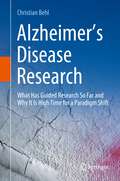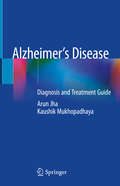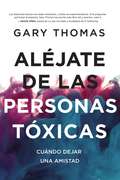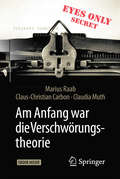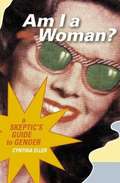- Table View
- List View
Altersdepression: Ein interdisziplinäres Handbuch
by Martin Hautzinger Andreas FellgiebelIn diesem sehr praxisnahen Handbuch zur Altersdepression werden s#65533;mtliche allgemeinen wie auch sehr spezielle Therapieoptionen #65533;bersichtlich und pr#65533;zise dargestellt. Es wurde h#65533;chster Wert auf die Alltagstauglichkeit der Inhalte gelegt, damit Arzt und / oder Therapeut die hier beschriebenen Therapieverfahren schnell anwenden kann. Im ersten Teil des Buchs werden die f#65533;r das Verst#65533;ndnis der Altersdepression wichtigen Besonderheiten abgehandelt, der zweite Teil umfasst die Therapiem#65533;glichkeiten unter Ber#65533;cksichtigung der biologischen und psychologischen Bedingungen des Alters, der dritte Teil stellt etablierte und neue Behandlungsrahmen sowie innovative Therapiekonzepte vor.
Altersdifferenzierte Führung zur Verbesserung des Führungserfolgs: Eine Analyse der Beziehungen zwischen Führenden und Geführten
by Anja Bendixen-DanowskiIn dieser Studie erfolgte erstmals im Rahmen der altersdifferenzierten Führungsforschung eine Analyse der Beziehungen zwischen Führenden und Geführten eines Unternehmens. Der dreistufige Mixed-Method-Ansatz umfasst qualitative Expertise-Interviews (N = 30), welche die Grundlage für eine Online-Befragung der Mitarbeitenden (N = 249, 68 %) einer digitalaffinen Firma bildeten. Im anschließend virtuell durchgeführten zweitägigen Führungskräfteworkshop (N = 30) wurden Handlungsempfehlungen abgeleitet. Diese zielten darauf ab, die Ansprüche von Berufseinsteigenden zu berücksichtigen, die Interesse an beruflicher Weiterentwicklung und abwechslungsreichen Arbeitsaufgaben zeigten. Zusammenfassend lässt sich konstatieren, dass die Bewältigung der Distanz, die durch das zweijährige Homeoffice während der COVID-19-Pandemie entstanden ist, eine anspruchsvolle Führungsaufgabe darstellt. Das Ziel der hier angestoßenen Organisationsentwicklung besteht in der langfristigen Steigerung der Arbeitszufriedenheit und Leistungsbereitschaft. Die abgeleiteten praktischen Implikationen empfehlen sich für einen Praxistransfer.
Altersgerechte Fahrerassistenzsysteme: Technische, psychologische und betriebswirtschaftliche Aspekte
by Dieter Schramm Heike Proff Matthias BrandMenschen in hoch entwickelten Ländern werden immer älter. Sie möchten im Alter mobil sein, haben jedoch oftmals Probleme im Straßenverkehr. Auch wenn sie häufig für altersgerechte Produkte, die die Sicherheit erhöhen, einen Aufpreis bezahlen, ist die Nachfrage nach Fahrerassistenzsystemen bei älteren Autofahrern bislang gering. Das Buch fasst Ergebnisse des Projektes ALFASY (ALtersgerechte FAhrerassistenzSYsteme) zusammen, in dem ein akustisches Fahrerassistenzsystem für die Bedürfnisse der stetig wachsenden Gruppe der älteren Fahrerinnen und Fahrer (50 Jahre und älter) entwickelt und aufgebaut wird. Untersucht wurden technische, psychologische und betriebswirtschaftliche Aspekte.
Alterspsychotherapie und klinische Gerontopsychologie
by Andreas MaerckerDer Anteil älterer Patienten in psychotherapeutischen Praxen nimmt zu. Können Sie mit diesen Patienten umgehen? Eine adäquate Diagnostik und Behandlung ist ohne ein grundlegendes Verständnis für den älteren Menschen nicht möglich. In drei klar strukturierten Teilen bietet dieser Therapieleitfaden - die Grundlagen der Gerontopsychologie und -psychotherapie, - Störungen, die im Mittelpunkt des therapeutischen Einzelsettings stehen, - hochrelevante Problemfelder, in denen Sie als Therapeut über das übliche Therapiesetting hinaus wirksam werden können. Das ansprechende und übersichtliche Layout, Hervorhebungen von Kernaussagen, zahlreiche Übersichten, Übungsbeispiele und Therapiematerialien machen das Buch zu einem unentbehrlichen Leitfaden für Weiterbildung und Praxis.
Altruism in Cross-Cultural Perspective (International and Cultural Psychology)
by Douglas A. VakochAltruism in Cross-Cultural Perspective provides such a scholarly overview, examining the intersection of culture and such topics as evolutionary accounts of altruism and the importance of altruism in ritual and religion. The past decade has seen a proliferation of research on altruism, made possible in part by significant funding from organizations such as the John Templeton Foundation. While significant research has been conducted on biological, social, and individual dimensions of altruism, there has been no attempt to provide an overview of the ways that altruistic behavior and attitudes vary across cultures. The book addresses the methodological challenges of researching altruism across cultures, as well as the ways that altruism is manifest in difficult circumstances. A particular strength of the book is its attention to multiple disciplinary approaches to understanding altruism, with contributors from fields including psychology, anthropology, sociology, biology, communication, philosophy, religious studies, gender studies, and bioethics.
Altruism, Narcissism, Comity
by Nathaniel J. PalloneHow does the sense of basic fairness--or selflessness versus selfishness--arise? How is it exhibited behaviorally? How is it maintained? Few topics hold more contemporary significance or have proved more elusive to specification in precise scientific terms. Current research perspectives on altruism, narcissism, and comity by distinguished behavioral scientists from around the world were brought together in a special issue of Current Psychology (Summer 1998) and are offered here in a useful compendium.Chapters and contributors include: "Equity, Justice, and Altruism" by Graham F. Wagstaff; "Reactions to the Fate of One's Brainchild After Its Disclosure" by Sidney Rosen and Shannon Wheatman; "Need Norm, Demographic Influence, Social Role, and Justice Judgment" by Helen E. Linkey and Sheldon Alexander; "Adaptive and Maladaptive Narcissism" by Robert W. Hill and Greg Yousey; "Perceptions of Self-Oriented and Other-Oriented Help-Providers" by Mark A. Barnett, Guy D. Vitaglione, Jeffrey S. Bartel, Birgit S. Valdez, Lee Ann Steadman, and Kimberly K. G. Harper; and "Pathological Narcissism and Serial Homicide" by Louis B. Schlesinger. Altruism, Narcissism, Comity will benefit students, researchers, and practitioners in the psychological sciences, sociology, political science, philosophy, law, and other disciplines concerned with the nature of selflessness, heroism, justice, and their variants.
Altruismus: Interdisziplinäre Perspektiven
by Sebastian Schmidt Dagmar Kiesel Thomas SmettanAltruismus scheint im Alltagsverständnis seinen uneingeschränkt positiven Ruf als ebenso wünschenswerte wie seltene Tugend verloren zu haben und durch ein Ethos des Eigennutzens ersetzt worden zu sein. Angesichts globaler Krisen wie dem Klimawandel, großer Flüchtlingsbewegungen, Kriege und Armut ist die Bereitschaft zur Verhaltensänderung bzw. zum Verzicht zugunsten kommender Generationen oder hilfsbedürftiger Menschen weniger selbstverständlich als das Phänomen der psychologischen Reaktanz und die Weigerung, Einschränkungen der persönlichen Freiheit oder des Konsums hinzunehmen. Zeitgenössische Ethikerinnen und Ethiker müssen sich demnach mit der Frage nach der Motivation für ein Handeln auseinandersetzen, das in erster Linie nicht dem eigenen Wohl, sondern dem Wohl anderer dient. In diesem Sinne beleuchtet der vorliegende Band das Thema Altruismus in seinen verschiedenen, wechselseitig aufeinander verweisenden Facetten: Wie ist das Wesen altruistischen Handelns zu bestimmen? Liegt Altruismus in der Natur des Menschen? Lässt sich Altruismus widerspruchsfrei in verschiedene Ethiktypen einordnen? Wie verstehen verschiedene philosophische Traditionen und Religionen den Altruismus? In welchem Verhältnis steht der Altruismus zum guten Leben? Und: Wie ist altruistisches Handeln motiviert? Da diese Fragen in verschiedenen Fachwissenschaften und mit unterschiedlichen Perspektivierungen gestellt werden, ist dieser Sammelband interdisziplinär konzipiert: Philosophie und Religionswissenschaft kommen ebenso zu Wort wie Verhaltensökonomie und Evolutionsbiologie. Auch anthropologische, soziologische und psychologische Zusammenhänge werden beleuchtet. Dementsprechend richten sich die hier versammelten Aufsätze an ein sehr breit gefächertes akademisches Publikum, aber auch an eine interessierte öffentliche Leserschaft außerhalb des universitären Kontexts. Mit Blick auf diese Zielgruppen führen die einzelnen Beiträge in das jeweilige Thema ein und präsentieren gleichzeitig eine eigene Forschungsposition der Autorin bzw. des Autors.
Altruistic Emotion, Cognition, and Behavior (Psychology Library Editions: Emotion)
by Nancy EisenbergOriginally published in 1986, this book was an effort to integrate thinking and research concerning the role of emotion and cognition in altruistic behaviour. Prior to publication there was a vast body of research and theorizing concerning the development and maintenance of prosocial (including altruistic) behaviour. This book focusses primarily on a specific set of intrapsychic factors involved in prosocial responding, especially emotions and cognitions believed to play a major role in altruistic behaviour. In the final chapters these intrapsychic factors are also discussed in relation to a variety of other relevant factors including socialization and situational influences on altruism.
Altruistically Inclined?: The Behavioral Sciences, Evolutionary Theory, and the Origins of Reciprocity
by Alexander J. FieldAlexander J. Field is the Michel and Mary Orradre Professor of Economics at Santa Clara University.
Always Picked Last
by Kevin KearnsWhat started out as typical “boys will be boys” teasing and horseplay turned into a living nightmare for Kevin Kearns who learned that his once safe neighborhood turned into a war zone of bullies. Small for his age, and not as physically adept at playing sports as all the other boys in the neighborhood, Kevin was soon the kid who was always picked last for the ball games. Up at bat, he endured merciless teasing, dropping the ball in the outfield earned him the lasting derision of his teammates. “We’d be better off without him!” While some of the incidents seem shocking, bullying goes on everywhere. There is no such thing as “boys will be boys” if it excuses bullying behavior. After losing his father at a young age, Kevin felt adrift and alone…a perfect target for intensified bullying. His mother felt helpless. His teachers felt sorry for him. His uncle decided that he needed to learn to defend himself and enrolled Kevin in a martial arts program. The martial arts training certainly taught Kevin how to defend himself, but more importantly, it taught him what it meant to be successful at something. It developed his self-esteem and helped him to overcome the environment of bullying at school and at home. Kevin’s early introduction into martial arts turned into a lifelong passion of personal and physical development. Today, Kevin is known as Coach Kearns to many people, among them UFC fighters who turn to Kevin to learn how to improve their skills. If you are being bullied, or know someone who is, Kevin’s story serves as proof that there is a way out and that life after being bullied can be fulfilling and enduring.
Always Separate, Always Connected: Independence and Interdependence in Cultural Contexts of Development
by Catherine RaeffIn recent years, there has been a proliferation of theoretical and empirical scholarship on how issues of human separateness, or independence, and issues of human connectedness, or interdependence, are played out in diverse cultural contexts. Despite agreement on the value of understanding culture and development in terms of independence and interdependence, many issues remain open for continued theoretical refinement and empirical analysis.This book presents a fresh conceptualization which holds that independence and interdependence are multifaceted and inseparable dimensions of human functioning that may be defined and enacted differently in different cultures. Thus, the current approach accounts for the fundamental separateness and connectedness of all human beings in a way that is both universally applicable and culturally sensitive. Based on this conceptual approach, the focus of this text is to delineate how varied independence and interdependence issues are interrelated during development in culturally distinct ways. In doing so, the book offers a conceptual approach that moves cultural and developmental analyses beyond investigating whether some cultures value independence or interdependence more or less than others, to investigating how both independence and interdependence are construed and particularized during development around the world.Always Separate, Always Connected: Independence and Interdependence in Cultural Contexts of Development will be of interest to a wide range of developmentalists in psychology, education, family studies, anthropology, and sociology. In addition, the book could serve advanced undergraduates, as well as graduate students in these varied disciplines. It may also be of interest to social welfare practitioners, such as clinical psychologists, guidance counselors, and social workers.
Always There, Always Gone: A Daughter's Search for Truth
by Marty Ross-DolenFor fans of Natasha Trethewey and Maggie Smith, a mother-daughter story of multigenerational trauma, grief, discovery, and love, with the backdrops of an historic American tragedy and an iconic family business, written in lyrical, fragmented form.In 1960, six years before Marty Ross-Dolen was born, her maternal grandparents were killed in an airline disaster involving the collision of two commercial jets over New York City. They were traveling from Columbus, Ohio, to seek placement for their family&’s iconic magazine, Highlights for Children, on the newsstands. Their daughter—Marty&’s mother—was fourteen years old at the time. This genre-bending memoir tells Marty&’s story of being raised by a mother in protracted mourning. The fragmented narrative explores Marty&’s journey, from personal ways of coping as a child to the evolution of a mother-daughter relationship that matured over time. It is also about her longing to know her maternal grandmother, and through saved letters and photographs from her grandmother&’s life, she enters a fantastical relationship that serves to replace one that otherwise could never exist. Ultimately it is about the discovery of truth, in unearthing the story of her grandparents&’ deaths and her mother&’s acute loss, in freeing her grandmother&’s image from the weight of a tragic death, and in Marty&’s own delivery from darkness. Beyond that, it is about universal life choices, the ways human beings unknowingly determine their destinies, and the healing powers of truth and love.
Always With Me: The Guide to Grieving Death Through Integrative Medicine
by Michelle A. SmithAlways With Me guides those who have lost a loved one how to discover happiness once again. Losing a loved one to death, especially after a long-term relationship, can be exceedingly painful. The intense emotions can feel overwhelming and even paralyzing at times. The joy one once felt seems to be gone and impossible to recover. The days are dark, and the nights are even darker. Always With Me works to show those who have lost a loved one that there is a light shining at the end of pain. In Always with Me, Michelle A. Smith, yoga therapist and energy worker, shows those who have lost a loved one how to journey back to happiness and connection once again. Using her years of training and experience in the field of integrative medicine, Michelle shows readers how to:Use the various tools of integrative medicine to know that they are not aloneUse physical postures, breath work, and meditation practices to find happiness after loss Embrace the power of Reiki or physical touch to feel more connected to everyone Immerse themselves in the healing sounds and vibrations of the Tibetan singing bowls to shift into a new space of happiness and peace Find peace within what is going on around them
Always You
by Chloe Fisher'I'm not going to tell you that everything happens for a reason. Those words are cold comfort in any traumatic moment. This is what I will say, though: I see you. I hear you. I am with you.'Growing up on the Northern Beaches of Sydney, Chloe Chapman thought her life would unfold close to home, surrounded by childhood friends and familiar shores. But on a spontaneous girls' trip to Bali, she met pro-surfer Paul Fisher - and everything changed. The connection was instant, and together they embarked on a whirlwind life of love, travel and building their dream careers.As Paul's success as DJ Fisher exploded, life looked golden. However, behind the scenes, Chloe carried a quiet ache: all she ever wanted was to be a mum. But her journey to motherhood was anything but smooth - it was a rollercoaster of juggling life on tour with fertility struggles and heartbreak. Through it all, she found power in vulnerability, purpose in storytelling, and strength in community, which she now shares through her Darling, Shine! podcast and beyond. Always You is more than a memoir - it's the handbook Chloe wishes she had to help her heal. Alongside her honest, heartfelt story are breakout sections filled with guidance, reflections, and tools for anyone navigating fertility, grief or uncertainty. Whether you're in the depths of trying to conceive, supporting someone who is or simply searching for hope - this book is for you.Because one day, you'll look back and whisper to the one who made it all worthwhile . . . It was always you.
Always a Sibling: The Forgotten Mourner's Guide to Grief
by Annie Sklaver OrensteinA practical, compassionate guide to sibling loss, with research, stories, and strategies for &“forgotten mourners&” as they move through the stages of grief towards finding meaning. After her brother was killed by a suicide bomber in Afghanistan, Annie Sklaver Orenstein was heartbroken and unmoored. Standing in the grief section of her local bookstore, she searched for guides on how to work through her grief as a mourning sibling—and found nothing. More than 4 million American adults each year will lose a sibling, yet there isn't a modern resource guide available that speaks directly to this type of grief that at times can be overshadowed by grieving parents and spouses and made even more difficult by the complexities of sibling dynamics. In AlwaysaSibling, Annie uses her own story and those of others to create the empathic, thoughtful, practical resource that she sought. Divided into three sections: With, Without, and Within, it creates a framework that enables the reader to ground themselves in order to process and validate this often overlooked grief. Annie guides readers to capture the memories and emotions of life with their now deceased sibling, then moves to addressing the grieving process in detail as they navigate life without them. Ultimately, readers will find ways to experience their sibling's presence within themselves and acknowledge their legacy. With practical strategies rooted in proven grief processing techniques, trauma recovery, and psychoanalysis, Always A Sibling truly supports mourners through the unique experience of sibling loss.
Alzheimer's Day Care: A Basic Guide (Series in Death, Dying, and Bereavement)
by David A. Linderman Nancy H. Corby Rachel Downing Beverly SanbornA book whose purpose is to offer guidance to individuals, organizations and agencies on how to develop day care programmes for patients with Alzheimer's disease or a related dementia. A range of programme aspects are covered from administrative details to social factors and evaluation techniques.
Alzheimer's Disease I
by Juan Moises de la Serna Adriana Ethel AllendeWhat is it, what are its causes, what consequences does it entail? Discover all the answers to Alzheimer's disease. Alzheimer's is a disease that has increased in terms of the number of cases affected in recent years, which in turn has caused many questions to arise when a person or a family member receives the diagnosis, such as, what Alzheimer's is, what its origin is, if there is a treatment, how the disease evolves, what the consequences in everyday life are, what the psychological effects on the patient are, if it can be overcome, if it is transmitted to children. This opens up a whole collection of issues to deal with in order to calm the uncertainty felt when getting to know that one suffers from a disease that is increasingly "common" and widespread, and of which little is known about the latest scientific advances in this area, due in large part to the complexity of the technical language used, but also because these advances usually reach only specialists through meetings and congresses where this type of information is shared.
Alzheimer's Disease and Other Dementias: A Practical Guide (Guides To Caregiving Ser.)
by Marc E. AgroninWorking with the needs of patients with Alzheimer’s disease can be a major challenge for primary care physicians, psychiatrists, and other mental-health professionals. Alzheimer’s wreaks havoc on the patient, and its degenerative nature can create a protracted period of anguish and anxiety for the patient’s family. Dr. Marc Agronin has put his years of experience as a geriatric psychiatrist to work to create an eminently useful resource for psychiatrists and others who treat patients suffering from Alzheimer’s disease or other dementias. Now in its third edition, Alzheimer's Disease and Other Dementias uses concise and clear language to outline the symptoms, effects and treatments used to combat the progress of Alzheimer’s disease and other dementias likely to be suffered by older patients. Enriched by case studies from his own clinical practice, Dr. Agronin creates a volume full of humanity, insight, and knowledge that is sure to inform and improve the habits and methods of any clinician who deals with Alzheimer’s disease and other forms of dementia.
Alzheimer's Disease: Cause(s), Diagnosis, Treatment, and Care (Routledge Revivals)
by Zaven S. Khachaturian Teresa S. RadebaughPublished in 1996: Alzheimer's disease is characterized by memory disturbances and changes in personality and is associated with aging, although it can occur in people under 65. It is a progressive disease, painful to witness as the patient's health declines. Alzheimer's Disease: Cause(s), Diagnosis, and Care, with its complete and authoritative discussions, will help you understand all facets of this complex disease. This book addresses a broad spectrum of topics ranging from diagnosis, causes, treatment, epidemiology, genetics, risk factors, and care and management. Alzheimer's Disease: Cause(s), Diagnosis, and Care is intended for a diverse audience, including practitioners and students, family members, and everyone who is concerned about this disease.
Alzheimer´s Disease II
by Juan Moises de la Serna Jacqueline M. NuñezWhat are the symptoms? How is it diagnosed? How many people is affected by it? Learn the latest research about the disease of Alzheimer Every day there are new discoveries about the disease of Alzheimer, but these usually are available for specialists and academics in the topic. This book aims to resolve this problem and show the latest advances about the disease of Alzheimer. Objective: The objective of the e-book is to serve as a first approximation to those people that have in themselves or in their families, the disease of Alzheimer. This book tries to show in a clear way, the results of the latest research about the disease of Alzheimer, and with it , to answer to the most relevant questions, what are the symptoms? How is it diagnosed? And how many people is affected by it? Recipients: -Professionals from the health system that have to, or want to learn more about the diagnosis and treatment of the Alzheimer´s disease. -Professors that want to offer updated information to their students, about the Alzheimer´s disease -To any person that has received the diagnosis of Alzheimer´s disease and their families, for them to know what to do in light of this disease. Topic Following there will be a detailed explanation about each of the principal topics of this piece: -Symptoms of Alzheimer: The families usually are the first ones to notice the symptoms associated with this disease, but for this they should be well informed of which these are. -Alzheimer´s disease: Once the first symptoms have been detected, is adequate to get in touch with an specialist to determine which is the best way to intervene. -Extension of the Alzheimer: Although the number is not the important, since each case is important because is the life of a person, the big numbers inform how this disease is spreading worldwide.
Alzheimer’s Disease Research: What Has Guided Research So Far and Why It Is High Time for a Paradigm Shift
by Christian BehlThis book highlights the key phases and central findings of Alzheimer’s Disease research since the introduction of the label ‘Alzheimer’s Disease’ in 1910. The author, Christian Behl, puts dementia research in the context of the respective zeitgeist and summarizes the paths that have led to the currently available Alzheimer’s drugs. As the reader is taken through the major developments in Alzheimer's Disease research, particularly over the past thirty years, Behl poses critical questions: Why are the exact causes of Alzheimer's Disease still in the dark, despite all the immense, worldwide research efforts in academia as well as in the pharmaceutical industry? Why has the majority of an entire research field kept focusing on a single hypothesis that establishes the deposition of the amyloid beta peptide in the brain as the key trigger of Alzheimer's pathology, even though this concept has still not been convincingly proven in the clinics? Are there other hypotheses that might explain the pathogenesis of this complex brain disease, and if so, why were these perspectives not adequately followed?In this book, Behl tries to answer these questions. Starting with the historical background, the author illustrates the long and arduous research journey, its numerous setbacks, and the many alternative explanations for the disease, which have started gaining increasing attention and acceptance in the Alzheimer’s research community only more recently. With his deep dive into the history and progression of this research, including the most recent developments, Behl explains why he believes that it is high time to promote a paradigm shift in Alzheimer’s Disease research.The book is written for all researchers in the fields of neurobiology and neurodegeneration, as well as other biomedical fields, who would like to gain a broad and beyond the surface insight into (the key developments of) one of the most promoted research fields of our time. With its extensive literature references and over 100 illustrations, the book is also attractive for students and interested lay persons. Elaborating on all the different aspects and research approaches of this research field, the author aims to convince the reader that the underlying causes of Alzheimer’s Disease may be much more complex than previously thought and that this must be considered for future research directions. While he hopes that the Alzheimer’s research community is finally ready to shed its ‘amyloid-straitjacket’ that has hampered progress for too long, he is also convinced that a much-needed paradigm shift can guide future Alzheimer’s Disease research and provide a new and broader perspective on this age-dependent brain disease.
Alzheimer’s Disease: Diagnosis and Treatment Guide
by Arun Jha Kaushik MukhopadhayaThis book provides a practically focused resource on the methodologies available for diagnosing and treating Alzheimer’s disease. The number of individuals affected by the disease continues to grow and as such there is an ever-increasing need for clear easy-to-digest guidance on how to appropriately diagnose and treat these patients. Within this work, chapters provide concise informative details of what this form of dementia is, how it can be diagnosed, managed and prevented making it ideal for those with limited experience in dealing with these patients. Information is provided on how to use a variety of the latest relevant techniques including mental state examinations, functional assessments, special investigations and the available drug treatments. Alzheimer’s Disease: Diagnosis & Treatment Guide is a concise clinical guide detailing how to diagnose and treat these patients. It’s easy-to-follow ideal for use by front-line physicians and trainees, who have no previous experience of diagnosing and treating this disease. The assessment component of the book is based on the WHO Mental Health Gap Action Plan (mhGAP) Dementia Intervention Guide for non-specialized settings.
Aléjate de las personas tóxicas: Cuándo dejar una amistad
by Gary ThomasEl llamado de tu vida es demasiado importante para que las personas tóxicas te lo quiten. En Aléjate de las personas tóxicas, Gary Thomas, el autor best seller de Matrimonio sagrado, se basa en historias bíblicas y modernas para proveerte con ideas prácticas para lidiar con personas difíciles en tu vida y vivir fiel al propósito que Dios te dio.Como cristianos, a menudo sentimos culpa y la responsabilidad de satisfacer las necesidades de las personas no saludables en nuestras vidas. Ya sea un hermano, padre, cónyuge, compañero de trabajo o amigo, las personas tóxicas siempre buscan frustrar el llamado de nuestra vida. Mientras buscas primeramente el reino de Dios, ellos buscan primeramente distraer tu atención y retrasar tu trabajo.En lugar de intentar la tarea imposible de apaciguar a las personas tóxicas, es hora de que dediquemos nuestra energía al único esfuerzo que vale la pena: completar la obra que Dios nos ha encomendado. Es solo cuando aprendemos a decir no a los malos patrones que podemos decir sí al bien que Dios ha planeado para nosotros.Gary Thomas, el autor best seller de Matrimonio sagrado, observa ejemplos bíblicos de las vidas de Jesús, Pablo y Nehemías. Tomado de los años que sirvió como pastor, Thomas comparte historias modernas y ejemplos prácticos para lidiar con personas difíciles en nuestras vidas. Cada capítulo incluye lecciones prácticas que puedes aplicar de inmediato. Descubrirás como:Establecer límites saludables para proteger el llamado de tu vidaBuscar refugio en Dios cuando te sientas bajo ataqueDiscernir cuándo alejarte de una situación tóxicaMantener un corazón tierno incluso en relaciones no saludablesAmar y servir a las personas difíciles al resistir su controlHacer crecer tu fuerza interior e invertir en personas confiables No podemos dejar que otros roben nuestra alegría o nuestra misión. Es hora de fortalecer nuestra defensa, aprender a poner buenos límites y enfocarnos en el propósito que Dios nos dio.
Am Anfang war die Verschwörungstheorie
by Marius Raab Claus-Christian Carbon Claudia MuthVerschwörungstheorien psychologisch zu ergründen ist wichtig: Wir finden dieses Phänomen seit dem Beginn menschlicher Kultur. Oft sind sie fiktional, basieren manchmal aber auch auf realen Fakten. Angeblich bewachen Templerritter den heiligen Gral und Reptilienwesen kontrollieren die Welt; tatsächlich wird unsere gesamte digitale Kommunikation überwacht. Oft sind diese Theorien gefährlich und hetzerisch, andere fordern aktives Eintreten für Demokratie und Menschenrechte. Die Verschwörungstheorie gibt es nicht, und auch nicht die Verschwörungstheoretiker. Psychologische Grundmechanismen wie das Vergnügen an „guten Geschichten“, am Rätsellösen und der Wunsch nach Selbsterkenntnis spielen eine Rolle. Dieses Buch erklärt die Hintergründe und zeigt, wie man besser und souveräner auf Verschwörungstheorien reagiert, aber auch, was den Reiz von Verschwörungstheorien ausmacht. Wir dürfen Ihnen nicht sagen, wer John F. Kennedy wirklich umgebracht hat, aber wir können Ihnen sagen, warum uns diese Frage bis heute nicht loslässt.
Am I A Woman?: A Skeptic's Guide To Gender
by Cynthia EllerAn analysis of the difference between gender and sex, with the author's personal examples. Includes bibliographic notes and complete index.
